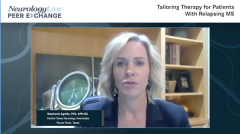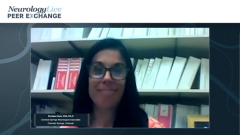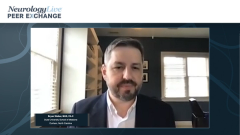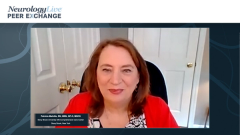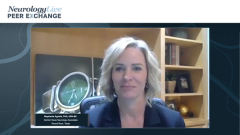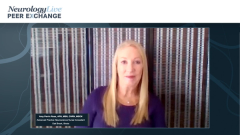
Managing MS in the Community: Advice and Resources
Advice and resources for colleagues, including community practitioners and neurologists, to encourage collaboration and best support for patients with multiple sclerosis (MS).
Episodes in this series

Transcript:
Amy Perrin Ross, APN, MSN, CNRN, MSCN:I know that all of us are advanced practice providers in large MS [multiple sclerosis] practices. What advice would each of you have for our colleagues out there who may not see the volume of a mass that we do every day, but are still faced with even a handful of patient with MS who can provide lots of challenges. Christen, I’ll ask you to start us off.
Christen Kutz, PhD, PA-C: We all started off that way. This isn’t intuitive, it’s just experience that happens over time. My advice to providers who maybe have less experience treating patients with MS is to network and identify people in your community that have more experience, and have a go-to person if you have questions. It’s important to go to conferences and meetings. This is probably one of the best ways I learned about all the different drugs—asking to meet with the pharmaceutical company MSLs [Medical Science Liaisons] and getting more knowledge from them. If you can’t attend a meeting, oftentimes they will do a highlight update after the meeting and come to your office and talk about the things that were discussed at meetings. I would say those few things are my best advice for a new PA [physician assistant], NP [nurse practitioner], or neurologist.
Amy Perrin Ross, APN, MSN, CNRN, MSCN:Pat?
Patricia Melville, RN, MSN, NP-C, MSCN: I agree with all those things. We were all new at one point. I’m not going to tell you how many years I’ve been at our MS center, but suffice it to say, it’s been a long time. It is hard coming into the MS medical community now. When I first started, we had no DMTs [disease-modifying therapies] available, now we have 19 or more and it’s growing every day. Networking, reaching out to colleagues, finding a mentor if you can, reading, educating yourself, attending as many conferences—now virtually, hopefully eventually in-person someday—these are going to be the best. And listen to your patients. My patients have given me education over the years as well.
Amy Perrin Ross, APN, MSN, CNRN, MSCN:Brian, how about you?
Bryan Walker, MHS, PA-C: I tend to steer everybody either to the CMSC [Consortium of Multiple Sclerosis Centers] or IOMSN [International Organization of Multiple Sclerosis Nurses] for additional information regarding what’s going on, not only regarding what’s new for medications, but also what’s new for all types of therapies and taking care of patients living with MS and their families. You need to leverage those resources as best as you can, whether it’s asynchronously on your own time or if you’re able to get to a conference, whether it’s virtual or in-person, it’s going to be important. That brings back that point that Christen made as well, with respect to networking. I agree with Pat also, if you can find yourself a mentor, and it doesn’t have to be local—nowadays we’re able to get on a FaceTime or Zoom meeting, or what have you—and be able to make those connections and to have someone to help you navigate through that is important.
Amy Perrin Ross, APN, MSN, CNRN, MSCN:For those that may be listening or watching today that are new to MS, CMSE is the Consortium of Multiple Sclerosis Centers, and the IOMSN is the International Organization of Multiple Sclerosis Nurses. The website for the CMSC is MScare.org. Lots of wonderful resources for all kinds of people. We’ll finish up this question with Stephanie.
Stephanie Agrella, PhD, APN-BC: I would just come back to the fundamental principle of treating MS. Making an accurate diagnosis using that McDonald criteria is key, and as we discussed earlier, getting started on an effective therapy as quickly as possible—those are the 2 things that I would focus on. Another thing that can be helpful—and it’s something that we offer to our community—is the ability to refer those patients with MS to us for a consult. By doing that, we’re not necessarily directing the treatment, but we’re giving an opinion on what options might be most beneficial for that particular patient. We tend to see those patients annually, and they continue with their community neurologist or community practitioners, and that’s a win-win for the community, neurologist, for the patient, and for us as well. I would just end with that.
Amy Perrin Ross, APN, MSN, CNRN, MSCN:Thank you all so much. I would like to thank this wonderful panel, Christen Kutz, Stephanie Agrella, Bryan Walker, and Patricia Melville for this wonderful discussion. I’d like to thank you, as an audience, for watching Neurology Live® Peer Exchange. If you enjoyed the content, I suggest that you subscribe to the Neurology Live® newsletters to receive information about upcoming Peer Exchange segments and other content available to you. Thank you all so much.
Transcript edited for clarity.
Newsletter
Keep your finger on the pulse of neurology—subscribe to NeurologyLive for expert interviews, new data, and breakthrough treatment updates.

